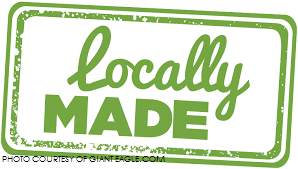Many people purchase local food at farmers markets and are willing to spend a few extra dollars to support their community farmers. The Raleigh Farmer’s Market is a popular spot to purchase locally grown food where North Carolina farmers sell fresh produce, plants and other specialty items.
Since localism is a trend within food markets, it should also be a trend within fashion.
Buying locally benefits the environment and the economy. A variety of stores manufacture their products in North Carolina and some designers are even from NC.
TS Designs: TS Designs began as a small, manual screen printing operation founded in 1977 printing shirts for companies like Nike, Polo and Tommy Hilfiger. After the 1993 North American Free Trade Agreement (NAFTA) companies transitioned product manufacture to Mexico to take advantage of a lower cost. Since the NAFTA agreement, TS Designs focuses on three things: people, the planet and profits. TS Designs still sells to environmentally and socially conscious businesses and organizations.The t-shirts are made 100% from North Carolina cotton and are made in Burlington, NC, providing more than 500 jobs to the area. Public tours of TS Designs are offered on the 10th of every month.
Peter Millar: Founded in 2001, Peter Millar is an accessible luxury brand with lifestyle apparel. Peter Millar offers a wide range of casual and formalwear including golf apparel. The clothing line is sold at 1,200 golf resort pro shops, country clubs, retail stores, as well as most Nordstrom and Neiman Marcus stores. Sponsored by numerous gold professionals who are brand and style ambassadors, the clothing is often worn at golf tournaments. The design studio and warehouse is located in downtown Raleigh, NC, employing about 35 people. The bulk of employees are located in Durham, NC, at the Peter Millar distribution center, where an additional 200 employees are in charge of quality assurance. Peter Millar retail store is located in North Hills shopping center, but products are also sold at Nordstrom in Southpoint shopping mall. Today, they distribute globally to North America, Europe, Asia, Australia, and the South Pacific.
Pilot Mills Company, a textile factory, is a significant part of Raleigh’s history. Construction started in 1890 and opened in 1893. In 1893, Raleigh was starting to be recognized as a cotton mill town when the price of cotton per pound dropped to four cents. There is record of one person working 58 hours at the textile mill during the week with a paycheck of $9.56 in 1936. Workers were typically working 11 hour days spinning yarn to go to the New York markets.
Pilot Mill: Pilot Mill is located near William Peace University on the edge of downtown Raleigh, NC, and is listed in the National Register of Historic Places. In 1910, the mill had 425 looms, 11,000 spindles, and 300 workers transforming 5,000 bales of cotton into yards of cloth. Production continued until 1982. They have won several awards for their design: Anthemion award, the Lowe award, the Beautification award, and the Best Redevelopment Building of 2002.
Purchasing clothing, food, or any locally made items is like an investment within the community. Small local businesses create more jobs to residents and locally made products require less transportation contributing to less congestion, habitat loss, and pollution. Supporting North Carolina based companies and designers strengthens the economic base of the community.

Leave a Reply